| 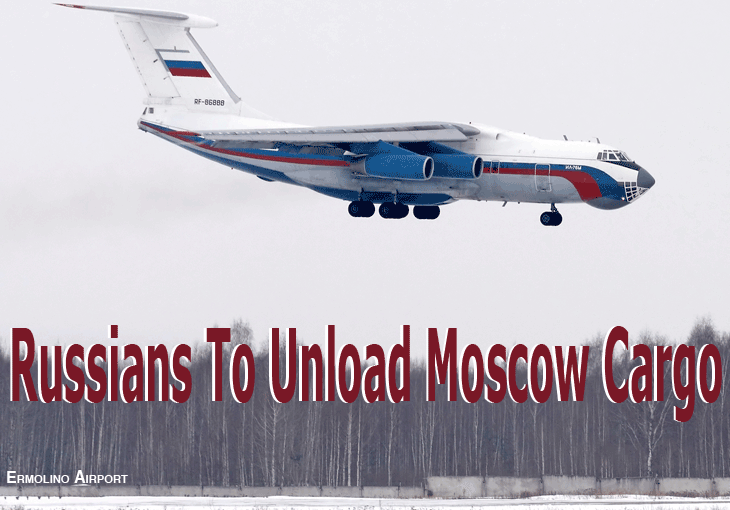
 he
Russian government, together with the
country’s leading air freight
companies, is considering unloading
the Moscow hub, Russia’s largest
air cargo hub (which is formed by Sheremetyevo,
Domodedovo, and Vnukovo airports and
accounts for up to 83 percent of air
cargo traffic to Russia), because of
its inability to deal with the ever
growing cargo traffic. he
Russian government, together with the
country’s leading air freight
companies, is considering unloading
the Moscow hub, Russia’s largest
air cargo hub (which is formed by Sheremetyevo,
Domodedovo, and Vnukovo airports and
accounts for up to 83 percent of air
cargo traffic to Russia), because of
its inability to deal with the ever
growing cargo traffic.
A significant
increase in air cargo traffic in Russia
in recent years has led to serious problems
for the Moscow airports due to the limited
resource of runways, as well as insufficient
cargo capacity.
According
to Russian Ministry of Transport analysts’
estimates, by 2020, airports of the
Moscow hub will not be able to serve
at least 60,000 tons of cargo.
Sergey
Shkvarko, a co-owner of Aerokargo +
company, one of Russia’s leading
air cargo operators, comments:
“Because
of the current congestion of the Moscow
air cargo hub, many carriers found it
difficult to obtain slots to charter
cargo flights. Besides the lack of runways,
there is also a lack of places on the
platforms for cargo aircrafts.”
In this
regard, the Russian government, in cooperation
with local air freight companies, is
considering taking a package of measures
aimed at solving the problem.
As the
Moscow airports are not yet able to
heavily invest in building new runways
and new large cargo terminals in the
short-term, the unloading of Moscow
air cargo hub could be among the potential
measures through the redirection of
freight flows to the airport’s
neighboring cities of Moscow, as well
as integration of a number of adjacent
airports into the Moscow aviation hub.
According
to state plans, in the latter case,
part of Moscow air cargo traffic could
soon be redirected to Ermolino airport,
which is located in the Kaluga region
and, on the base of which a new multi-modal
cargo complex—Freight Village
Kaluga—is expected to be established.
Ermolino
airport could be suitable for this,
being located 80 kilometers away from
the Moscow Ring Road and 61 km from
the Moscow Vnukovo airport, which is
expected to enable easy integration
into the Moscow aviation hub.
The volume
of investments in the project is estimated
at 30 billion rubles (USD$1 billion).
It involves building up to 400,000 sq.
m. of warehouse space and will have
an area of 500 hectares.
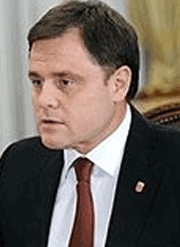 At
the same time, in additon to Ermolino,
there is a possibility that part of
Moscow cargo traffic may be also redirected
to Efremovo Airport, a former military
airport, which is located in the Tula
region, not too far from Moscow airports. At
the same time, in additon to Ermolino,
there is a possibility that part of
Moscow cargo traffic may be also redirected
to Efremovo Airport, a former military
airport, which is located in the Tula
region, not too far from Moscow airports.
Vladimir
Gruzdev, (right) Governor of the Tula
region and one of the initiators of
Efremovo Airport transformation project
into the air cargo hub, comments:
"We
can accommodate part of the Moscow airports'
cargo traffic. Efremovo Airport can
serve as an additional reserve airport
for Moscow, as it is only two hours
away by car from the capital. In addition,
it is located close to the Druzhba oil
pipeline, where a large oil refinery
could be built which will meet the fuel
needs of aircraft.”
Both projects
are expected to be implemented by state
funds, which in total could reach USD$15
billion.
The excessive loading of Moscow air
cargo hub has also sparked serious concerns
from leading private air cargo operators,
which are also considering some alternative
options for redirection of their traffic
from Moscow.
 For
example, as part of these plans, Kratos
Group, one of Russia's largest air cargo
operators, has recently started construction
of a cargo complex in Yaroslavl Tunoshna
airport. For
example, as part of these plans, Kratos
Group, one of Russia's largest air cargo
operators, has recently started construction
of a cargo complex in Yaroslavl Tunoshna
airport.
According
to Alexander Zubov, head of Kratos,
the new complex will have an area of
3,000 square meters, while the quality
of its services will be similar to those
provided by Moscow airports.
At the
same time, some Russian analysts believe
that redirection of cargo traffic from
the Moscow hub may cause some problems.
According to Rano Dzhuraeva, (right)
President of Russia’s Center of
Civil Aviation, currently 30 percent
of cargo handled in Moscow is further
shipped to the regions by road and rail
transport which is well-developed in
Moscow in contrast to the other regions,
which currently have a lack of necessary
rail and road infrastructure.
 According
to Dzhuraeva, the Vladimir, Kaluga,
and Tula airports are good airports
that will be able to partially unload
Moscow airports in the near future;
however, there is also a need to develop
the adjacent rail and road infrastructure.
Despite the ever growing need for alternative
gateways, some of Russia’s leading
air cargo carriers are not ready to
redirect their air cargo traffic from
Moscow.
According
to Dzhuraeva, the Vladimir, Kaluga,
and Tula airports are good airports
that will be able to partially unload
Moscow airports in the near future;
however, there is also a need to develop
the adjacent rail and road infrastructure.
Despite the ever growing need for alternative
gateways, some of Russia’s leading
air cargo carriers are not ready to
redirect their air cargo traffic from
Moscow.
According
to Sergey Shklyanik, (left) Senior Vice
President of Volga-Dnepr, Russia’s
largest air cargo carrier, the airline
has no plans to move from Moscow airports
in the next two to three years. According
to him, customers choose metropolitan
airports not only because of the convenience
of delivery, but also, for example,
because of the existence of customs
terminals. However, Shklyannik recognizes
that in the event of further deterioration
of the situation, the company may consider
alternative options, and partially redirect
traffic to other airports.
Eugene Gerden
|

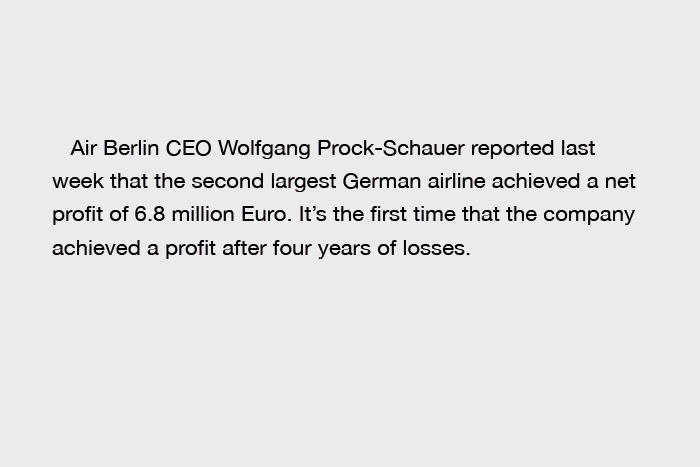



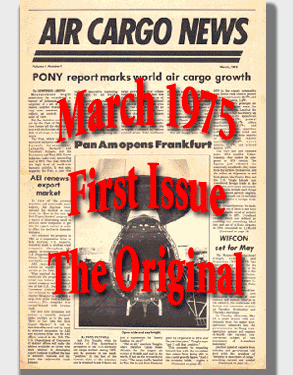

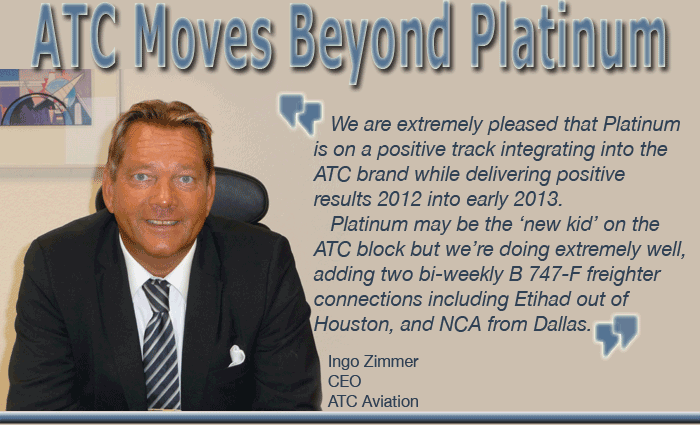

 “We
are excited about opening a new set
of books for the year,” David
Kerr, VP Cargo Etihad, tells FlyingTypers.
“We
are excited about opening a new set
of books for the year,” David
Kerr, VP Cargo Etihad, tells FlyingTypers.


 Recapping
The International Boston Seafood Show
(IBSS) 2013 held recently in Boston,
Massachusetts, the old cargo pro John
Ryan (R) now at Hawaiian Cargo, is pictured
with (L) Austin Parker (Hawaiian HON).
Recapping
The International Boston Seafood Show
(IBSS) 2013 held recently in Boston,
Massachusetts, the old cargo pro John
Ryan (R) now at Hawaiian Cargo, is pictured
with (L) Austin Parker (Hawaiian HON).

 At
the same time, in additon to Ermolino,
there is a possibility that part of
Moscow cargo traffic may be also redirected
to Efremovo Airport, a former military
airport, which is located in the Tula
region, not too far from Moscow airports.
At
the same time, in additon to Ermolino,
there is a possibility that part of
Moscow cargo traffic may be also redirected
to Efremovo Airport, a former military
airport, which is located in the Tula
region, not too far from Moscow airports. For
example, as part of these plans, Kratos
Group, one of Russia's largest air cargo
operators, has recently started construction
of a cargo complex in Yaroslavl Tunoshna
airport.
For
example, as part of these plans, Kratos
Group, one of Russia's largest air cargo
operators, has recently started construction
of a cargo complex in Yaroslavl Tunoshna
airport.  According
to Dzhuraeva, the Vladimir, Kaluga,
and Tula airports are good airports
that will be able to partially unload
Moscow airports in the near future;
however, there is also a need to develop
the adjacent rail and road infrastructure.
Despite the ever growing need for alternative
gateways, some of Russia’s leading
air cargo carriers are not ready to
redirect their air cargo traffic from
Moscow.
According
to Dzhuraeva, the Vladimir, Kaluga,
and Tula airports are good airports
that will be able to partially unload
Moscow airports in the near future;
however, there is also a need to develop
the adjacent rail and road infrastructure.
Despite the ever growing need for alternative
gateways, some of Russia’s leading
air cargo carriers are not ready to
redirect their air cargo traffic from
Moscow. 

